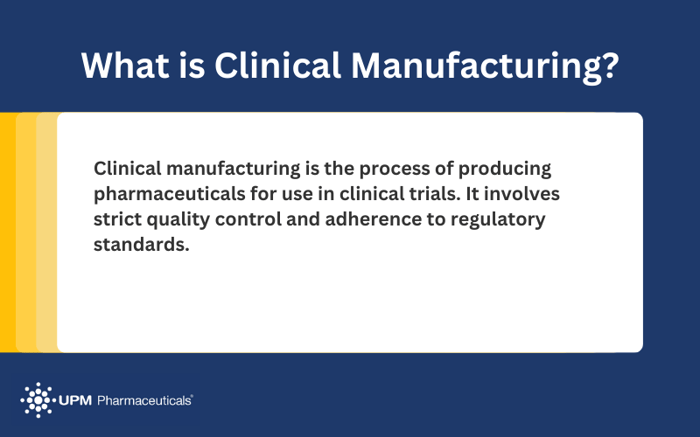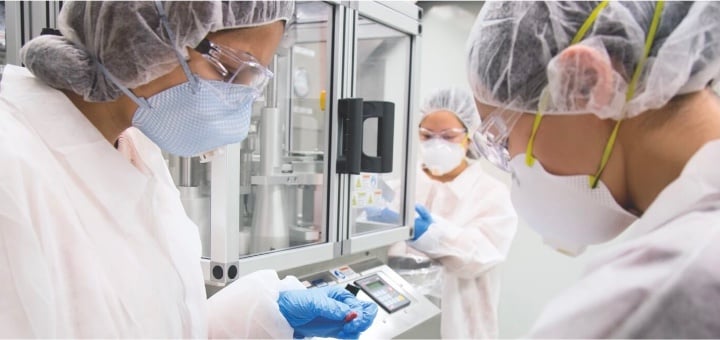Clinical manufacturing, or clinical trial material (CTM) manufacturing, is the specialized production of drugs for use in clinical research. It caters to small-scale, unique processes, distinct from larger-scale commercial manufacturing. These drugs support clinical studies to assess safety and efficacy, guiding potential commercialization. Adherence to strict regulatory guidelines, like the FDA's Good Manufacturing Practice (cGMP), ensures safety and quality in the manufacturing of clinical trial materials.
How Clinical Manufacturing Works: cGMP Guidelines
In the intricate realm of clinical manufacturing, adherence to the FDA's current Good Manufacturing Practices (cGMP) guidelines serves as an indispensable cornerstone, ensuring the production of safe, effective, and high-quality drugs for clinical research. These regulatory guidelines apply to a range of products, including small-molecule drugs, gene therapies, and more complex biologics, which require stringent quality standards and sterile manufacturing practices to mitigate contamination risks.
The cGMP guidelines encompass various facets of the clinical manufacturing process, including personnel training, quality control, facilities and equipment, component control, manufacturing records, and packaging. A well-documented quality plan, controlled environment, and consistent data recording are instrumental in meeting these standards.
Notably, cGMP guidelines are even more crucial for biologics due to their inability to be sterilized like small molecule drugs, necessitating a sterile and meticulously managed manufacturing process from start to finish. The strict regulatory guidelines safeguard trial participants' health and safety while ensuring valid data collection during the clinical research.
Therefore, pharmaceutical manufacturing must remain vigilant in upholding these high-quality manufacturing practices, given the pivotal role they play in the successful execution of clinical trials.

Clinical Manufacturing vs. Commercial: What's the Difference?
While the stringent adherence to cGMP guidelines remains a vital aspect in both clinical and commercial manufacturing, the two processes exhibit stark differences in their operational dynamics, particularly in terms of flexibility, batch uniformity, supply chain coordination, and quality assurance challenges.
Clinical manufacturing services are inherently flexible, designed to adapt to the ever-changing dynamics of a clinical manufacturing project. This flexibility is paramount in clinical trial manufacturing as it allows for swift reactions to formulation issues or regulatory updates.
Conversely, commercial manufacturing processes in dedicated manufacturing facilities operate under firm, established protocols that ensure batch uniformity and minimize variability.
Moreover, the coordination of supply chains in clinical manufacturing vs commercial presents distinct challenges. Clinical trials often involve components sourced globally, requiring meticulous supply chain management. Additionally, the rigorous quality assurance scrutiny in commercial manufacturing, borne out of familiarity with the product and process, contrasts with the variability inherent in clinical manufacturing, which can make quality assurance more complex.
Essentially, the two forms of manufacturing, although guided by the same cGMP principles, demand different operational approaches from a manufacturing organization, each tailored to their specific needs and constraints.
Benefits of Specialized Clinical Trial Manufacturing Services
Specialized Clinical Trial Manufacturing Services, such as those offered by 53Biologics, provide significant benefits to pharmaceutical companies. These services expedite the clinical trial process and ensure a seamless transition to market-scale manufacturing.
- Expedition of the Clinical Trial Process: Specialized clinical trial manufacturing services can significantly reduce the time taken to produce clinical supplies. This acceleration speeds up the overall clinical trial process.
- Seamless Transition to Market-Scale Manufacturing: These services facilitate an efficient transition from clinical trial material manufacturing to large-scale commercial production. This helps pharmaceutical companies meet market demands swiftly.
- Compliance with Regulatory Requirements: Specialized manufacturing teams are well-versed in global regulatory requirements. They implement a robust quality management system to ensure that all clinical manufacturing processes meet these standards.
- Expertise and Efficiency: The vast experience and technical expertise of specialized clinical trial manufacturing services enable them to handle the complexities of clinical manufacturing effectively. This offers pharmaceutical companies the freedom to focus on their core competencies.
FDA Regulations and Guidance
Navigating the complex landscape of FDA regulations and guidance is a critical aspect of clinical manufacturing. These regulations, published in Title 21 of the US Code of Federal Regulations, Parts 210 and 211 (21 CFR 210/211), dictate the standards for drug production across various phases of clinical trials. These guidelines provide a clear regulatory standard for the industry, ensuring that the quality assurance processes in place are sufficient to safeguard public health.
Pharmaceutical companies involved in clinical manufacturing must ensure strict adherence to regulations, which are enforced by regulatory authorities. These bodies monitor adherence to cGMP regulations, crucial for maintaining the expected quality of drug products. Drugs used in Phase I studies are generally exempt from 21 CFR 210/211 compliance, but exemptions do not apply once the investigational drug is available for use in Phase II or III studies.
FDA's guidance enhances the understanding of cGMP for investigational drugs used in Phase I clinical trials. Adherence to FDA regulations and guidance not only ensures the production of safe and effective pharmaceuticals but also provides freedom from regulatory infringements, thereby fostering trust among stakeholders in the rapidly evolving landscape of clinical manufacturing.
FAQ
What is the difference between commercial and clinical manufacturing?
The difference between commercial and clinical manufacturing lies in their purposes and applications. Commercial manufacturing focuses on producing goods for sale to the public, while clinical manufacturing is centered on creating products for use in healthcare settings, such as pharmaceuticals and medical devices.
What is GMP clinical manufacturing?
GMP clinical manufacturing refers to the Good Manufacturing Practices (GMP) guidelines that ensure the quality and consistency of pharmaceutical products during their production. These guidelines are crucial for maintaining the safety and efficacy of drugs, as they cover all aspects of the manufacturing process, including facility design, equipment, personnel qualifications, and process validation.
What is the difference between GMP and CMC?
GMP and CMC are both important aspects of drug development and manufacturing, but they serve different purposes. GMP, or Good Manufacturing Practice, focuses on ensuring the quality and consistency of the manufacturing process, while CMC, or Chemistry, Manufacturing, and Controls, deals with the specific details of the drug's composition and production.
Download Now: 32 Secrets to Avoid Project Delays [Free eBook]
CONTACT US
Partner with a Qualified CDMO: UPM Pharmaceuticals
Bringing a new drug to market is a lengthy, costly, and risky journey, compounded with the time pressure of being first in the marketplace. UPM is unlike other CDMOs because we are a large pharma supplier and an independent, family-owned CDMO, allowing us greater flexibility in our partnerships. To this point, our ended-to-end CDMO services have helped bring over 80 pharma products to market.
Our state-of-the-art seven-acre pharmaceutical campus features our commercial manufacturing and packaging site, commercial warehouse, and DEA-Approved vault. With extensive pharmaceutical industry experience and a solid track record of bringing drug products to market, our capabilities are the best that commercial pharma has to offer. Contact UPM to learn more about our contract development and manufacturing organization and how we can optimize your pharmaceutical project results.
Connect with Our CDMO Services

